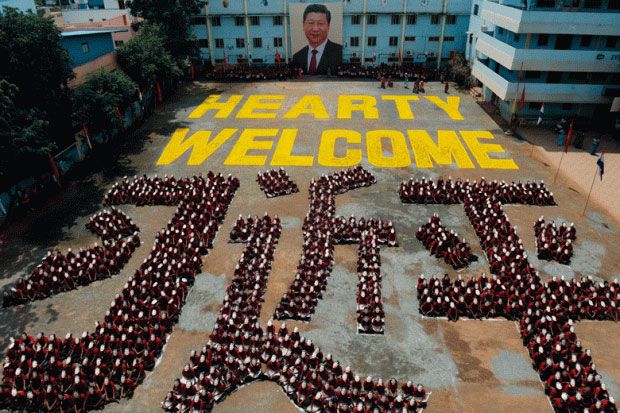India rolled out the red carpet for Chinese president Xi Jinping’s meeting with Prime Minister Narendra Modi, greeting the communist leader with a dazzling display by 2,000 schoolchildren in formation, spelling out his name.
Last week’s meeting was seen as an attempt to reset ties between the two superpowers, which have been strained by border disputes and trade tensions. Higher education might be seen as a natural area for increased cooperation, with both countries setting ambitious development goals and with international collaboration regarded as being key to the success of these.
But for all the pomp and circumstance, India seems to be pulling away from China when it comes to science and research. Days before Mr Xi’s visit, India’s University Grants Commission sent a notice to every vice-chancellor in the country, warning them that all academic cooperation with China must be approved by the Ministry of Home Affairs and the Ministry of External Affairs, “in addition to other clearances”.
There was no further explanation of the decision, but some scholars feel that it was motivated less by concerns about education and more by economic and political protectionism, which could hamper universities’ development.
Saikat Majumdar, professor of English and creative writing at Ashoka University, just north of New Delhi, told Times Higher Education that he found it “curious” that universities now had to obtain permission from the Home and External Affairs ministries, “which are responsible, respectively, for domestic security and diplomatic affairs”.
“It is hard to imagine that the concerns are purely academic,” Professor Majumdar said.
Alan Ruby, a senior scholar at the Alliance for Higher Education and Democracy at the University of Pennsylvania, said he felt that India’s decision was “shaped by a concern about protecting intellectual property, especially in areas of economic and technological advantage and national security”.
Mr Ruby, who advised the Indian government on the design of its “institutes of eminence” excellence initiative, viewed the move as “a continuation of the protectionist, India-first paradigm, a policy that has been pursued across most sectors of the economy since the 1950s. This has impeded the creation of international academic partnerships and co-branded institutions.”
Indian academics and institutions continue to reach out internationally, added Mr Ruby, including to his own unit at Pennsylvania. However, when it comes to dealing with China, there may be a recognition of the growing power imbalance between the two countries, as reflected in university rankings and international engagement.
China now has seven institutions in the top 200 of the THE World University Rankings; India’s highest performers are in the 301-350 band. In 2018, there were 492,185 international students enrolled at Chinese universities, including 23,198 from India. India, meanwhile, hosted 47,427 international students in 2018-19.
China seems to be actively courting Indian students. Earlier this year, it published a list of 45 universities authorised to teach medical programmes in English to foreign students. As some 21,000 of the Indian students in China are enrolled in medical courses, it was not surprising that the announcement created a buzz in the Indian media, to the point that the Indian embassy in Beijing felt the need to issue a clarification last week.
China also boasts nine joint university ventures with overseas institutions, such as Xi’an Jiaotong-Liverpool University. In contrast, foreign universities operating in India cannot grant degrees.
Philip Altbach, founding director of the Center for International Higher Education at Boston College, told THE that “India is finally waking up to the importance of internationalisation and the usefulness of collaboration with foreign universities, after decades of keeping barriers high”.
However, he said, internationalisation policies were not the main barrier facing universities. “India has a long way to go in providing funding to its higher education, creating appropriate governance, improving research performance, and all the other key factors that contribute to top academic performance,” Professor Altbach said.
In comparison, “Chinese universities pay ‘international standard’ salaries to academics from abroad it wants to attract and offers excellent research facilities to some. India does not. And the top Chinese universities have in recent years immensely improved, which is not the case for India.”
Professor Majumdar said that economics played a big role in the chasm between the two countries. “In most instances, forms of soft power follow the trail of hard power – even though the latter needs the former to sustain and stabilise its domination,” he said.
“Economic power has always shaped the trajectory of higher education. China is a far bigger economic power than India, so China’s greater success in this is also understandable.”
POSTSCRIPT:
Print headline: India looks to keep China at arm’s length
Register to continue
Why register?
- Registration is free and only takes a moment
- Once registered, you can read 3 articles a month
- Sign up for our newsletter
Subscribe
Or subscribe for unlimited access to:
- Unlimited access to news, views, insights & reviews
- Digital editions
- Digital access to THE’s university and college rankings analysis
Already registered or a current subscriber? Login








